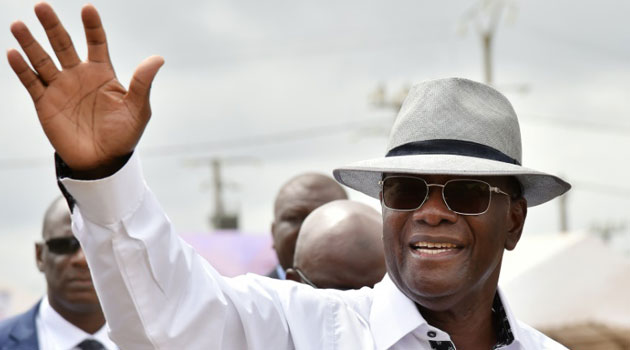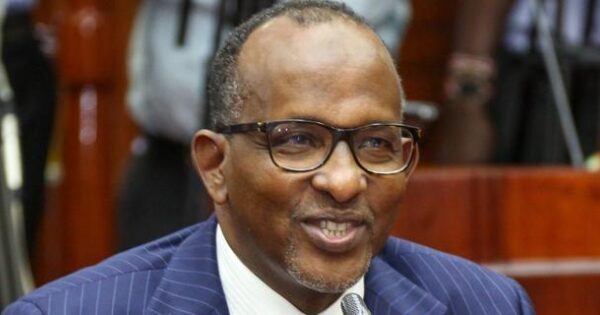By Dr. David Matsanga in London United Kingdom
There are times when I don’t believe the crazy things that happen in Africa. Most of them have happened in Uganda and the Ivory Coast. Both countries have scrapped age limits for the presidency.
July 27 marked my 35 years since our own Generals overthrew us in a military coup in 1985. I left Uganda with Dr. Milton Obote to Kenya and then to the United Kingdom where I reside till today. It was unknown to me that my journey of pain would last 35 years.
This week, I began my journey of 36 years in exile having jokingly lost to the government. Although, that is not what pains me because 35 years have healed me; what pains me is the level of democracy in Africa…but that is a story for another day. This week I will look at two countries that are conducting their elections in COVID -19 era. Uganda and Ivory Coast.

Let me turn to the events in the Ivory Coast and Uganda which worry me as a Pan Africanist. Gon Coulibaly, an economic technocrat and Ouattara loyalist since the 1990s, was earmarked in March as the candidate for the ruling Rassemblement des Houphouëtistes pour la Démocratie et la Paix (“RHDP”) party in the elections due in October. He represented a handpicked heir, trusted to sustain the strategy established during Ouattara’s nine years in power.
On 28.07.2020, President Museveni picked nomination papers for the Presidency under NRM. But Ouattara was undecided on the matter. Many RDHP parliamentarians and local mayors now pressure the 78-year-old Ouattara to run again; this was not his intention. He hoped to go out on a high – ‘par la grande porte’ – and set a statesman-like example of retirement by choice, making way for the next generation; however, events point in favour of him standing again.
Ouattara‘s leadership of reform of the regional currency, which will see the end of the West African CFA franc, would have been the crowning achievement of a presidency. This would have taken his country from post-war stagnation to sustained growth GDP growth rates around seven per cent before COVID-19 forced a slowdown, as it has worldwide.

Unlike Uganda where President Museveni is confident of winning by landslide in February 2021, there is a profound strategic dilemma that has caught Ivory Coast. President Museveni Will win because the opposition is fragmented and ill-prepared.
The death of Gon Coulibaly had undergone a heart transplant in 2012, and when he hurried back to Paris in early May. Some in Ivory Coast pondered whether he would have the energy required for an election campaign.
The Ivory Coast man who returned home on the 2nd of July 2020 , with his formal nomination by the RHDP penciled in for early in the next month, died on return. His sudden death on the 8th of July, at the age of just 61, was a terrible personal blow for Ouattara who had regarded him almost as a son and much more than a purely political protégé. However, it also left the President facing a profound strategic dilemma.
Ivory Coast is not as lucky as Uganda where the ruling party has one candidate. In Ivory Coast, the names of alternative potential RHDP candidates have been floated—notably the defence minister, and now interim premier, Hamed Bakayoko and the secretary-general of the presidency Patrick Achi. Both have solid electoral track records and ample experience of government.
But in the Ivory Coast over recent days the impression appears to be that they do not command the ultimate confidence of Alassane Ouattara to take on the leadership of the nation.
Speculation has grown that the President will conclude that he has no choice but to revert back on his promise to retire and stand for yet another term. Although, some respected legal experts disagree, he has always made a point of insisting that the constitutional reform of 2016 allows him to run again. In fact, many influential voices within the RHDP are now pressing him to do so.
This is not ‘rent-a-crowd’ fawning. Many members of the governing party have always felt that Ouattara offers the strongest blend of political appeal, governing capability, and international profile required to lead a country that envisions itself as West Africa’s ‘elephant’.
Similar to Uganda, which has a weak opposition, the Ivory Coast’s third term challenges can create chaos. In electoral terms, Ouattara’s greatest campaign asset might be the unconvincing state of the opposition figures who are actually free to stand.
Like my country Uganda, the Ivory Coast removed age limit and allowed anyone to stand after 75 years. The Ivorian authorities’ strong-armed the judicial system into blocking the hopes of the smooth-talking former parliamentary speaker Guillame Soro, who had great appeal for Cote D’Ivoire’s growing young population. Soro is now exiled in France after conviction in absentia for corruption.
Ex-president Laurent Gbagbo remains in Brussels on the orders of the International Criminal Court, while it considers the prosecution appeal against his acquittal on charges of human rights crimes. This leaves another former head of state, the 86-year old Henri Konan Bédié, as the main opposition challenger.
However, even if the RHDP party machine delivers victory for Ouattara, a third term risks hard questions from those who dispute its legitimacy and it may generate other significant political challenges too. Some 60 per cent of Ivorians are under the age of 25, and many young people are impatient for leaders more in tune with their concerns and outlook. Some 51 percent now live in towns and cities. This could bring people to the streets of Ivory Coast.

The sprawling Abidjan conurbation, in particular, weighs heavily in the political culture and national mood. Street protest and urban frustrations are a real factor, and something that fuels vocal grassroots support for both the Soro and Gbagbo camps.
Moreover, despite the government’s capable management, the COVID-19 crisis has struck a severe economic and social blow that is sure to impose painful legacy pressures. Even when real GDP was rising by seven percent per annum, increasingly evident inequality was brewing popular resentment.
Corruption appeared to be on the rise, and the obvious prosperity, construction, and consumption in parts of Abidjan were not reflected nationwide nor in all sections of society.
In the latter years of his second term, Ouattara recognized this and launched an ambitious programme to broaden the reach of development and nudge growth towards a more ‘inclusive’ model. Selling this as the core of an election agenda would be harder for a political veteran who has been in power since 2011, and who has since reverted back on his rhetoric about paving the way for a younger generation.
A third term Ouattara would also face challenges internationally, and particularly in West Africa. He has always presented himself as a statesman-like figure with restraint and respect for institutional values, setting a tone that has helped in the management of numerous regional crises—exemplified by his participation in a five-president mission to Bamako last week, an effort to broker a solution to Mali’s political and protest deadlock.
If a third term run sparks mass domestic protest or accusations of constitutional manipulation, the diplomatic standing and influence associated with Ouattara will be jeopardized.
Côte d’Ivoire’s President, like President Museveni, both face profoundly awkward questions as they ponder the third term. Museveni will embark on a journey of 36 years in power. Their bids could bring tremendous changes in both countries yet they may well conclude that, from their political perspectives, there is no viable alternative.
Both Uganda and Ivory Coast have no viable opposition. In Uganda, it is more divided and scattered than ever before. In Ivory Coast, the Gbagbo factor affects the opposition, and both countries in Africa could face these very challenges even after their post-COVID-19 elections.
However, if I am not wrong there will be post-election challenges. The dangers of dark clouds that hover over these two nations will turn into rain. If I am wrong then time will tell.
May God bless the Ivory Coast and Uganda.
The writer is a Political Scientist and International Relations with Conflict Resolution Expert bias, an investigative Journalist and a Pan African based in Surrey London United Kingdom.























































